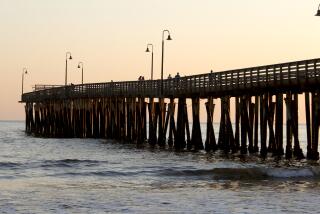Financial crisis leaves Caribbean projects beached
- Share via
PUNTA CANA, DOMINICAN REPUBLIC — The ocean glows a milky turquoise. Tiny waves lap at the sand, near a line of postcard-perfect palm trees. Hundreds of luxury villas are positioned to take in the view.
But there are no guests. There are no roofs either; neatly tied bundles of red tiles are stacked outside. The wind slams doors and rustles the yellowed newspaper taped to the windows.
The paralyzed work scene at the Cap Cana resort in the Dominican Republic, a development including four luxury hotels, three golf courses and a mega-yacht marina, is a victim of the global financial crisis, which has hit the Caribbean’s tourism industry especially hard.
Cap Cana fired 500 workers in October after Lehman Bros. Holdings Inc. declared bankruptcy and a $250-million loan fell through.
Construction is also paralyzed at the Ritz-Carlton Molasses Reef resort in the Turks and Caicos islands’ secluded West Caicos, where 60 Chinese workers revolted in October demanding back wages. About 160 workers have been sent home to China, and it’s unclear when construction will resume at the hotel, marina and condominium project, which is three-quarters complete.
Last month, the sprawling Atlantis resort in the Bahamas laid off about 800 workers, citing low occupancy. Baha Mar Resorts Ltd. laid off about 40 employees at its Sheraton Resort in the Bahamas and 40 more at the Wyndham Nassau Resort. The Bahamas Hotel Catering and Allied Workers Union called a demonstration to demand government aid.
“I’ve been in the business 38 years. I have seen the impact of the Gulf War. I have seen the recession of the ‘80s. Certainly Sept. 11,” said Robert Sands, senior vice president of external affairs at Baha Mar. “But nothing has been of a global nature, which makes the current financial situation we’re in much more worrisome.”
In Puerto Rico, the Caribe Hilton laid off more than 50 people last month because of rising costs and sluggish occupancy. The last time the hotel had to lay off workers was after the Sept. 11 attacks, General Manager Jose Campo said.
“What worries me is that this will last longer,” he said.
Even the normally busy holiday season is expected to be relatively quiet.
“There is space available for the holiday season and beyond,” said Alec Sanguinetti, CEO of the Caribbean Hotel & Tourism Assn.
“This is often a time when hotels are sold out and vacationers are looking for any place that has availability.”
Workers are spending their days off looking for jobs outside the tourism industry. Others have already been sent home.
Victor Felipe Feliz, 24, has been feeding his two children on store credit since he lost his construction job at Cap Cana last month.
“I need to work so I can buy Pampers, so I can buy food,” he said. “It has been a couple of months since I bought clothes. I can’t afford anything.”
Cap Cana plans to fire another 1,000 workers in the coming months, according to a company official who spoke only on condition of anonymity because he wasn’t authorized to release the information. But Cap Cana President Ricardo Hazoury said he expects the project to go forward as the company outsources certain services.
The 50-square-mile development is nestled in the Dominican Republic’s easternmost point amid lush jungle. Its developers include Deutsche Bank, the Trump Organization and the Ritz Carlton Hotel Co.
Cap Cana runs more like a city than a private development. It generates its own power, supplies its own water and has hundreds of villas and condominiums -- even a school. Some of the villas and hotels are inhabited, but most remain under construction.
“We used to have a lot of workers -- bricklayers, plumbers, electricians,” said Wilkin Cuevamato, who was laid off but later found work at another Cap Cana property. “The majority have left and gone home.”
Tourists willing to make last-minute travel arrangements will find some real bargains as hotels react to the soft period, according to Scott Berman, a tourism advisor for PricewaterhouseCoopers in Miami.
“If you’re flexible and have time on your hands, you’re going to find some favorable deals this winter,” he said.
But cheaper rooms are often offset by expensive airfare, according to Renaldo Inesta, division manager for AAA in Puerto Rico. American Airlines, the main carrier to the island, has cut back flights by 44%, though other airlines are stepping in to reduce the overall drop to 14%.
Beyond the holiday season, the picture is bleak. Getting money to finance new projects will be difficult amid the credit squeeze. A new United Nations report predicts access to external financing for the region will be limited, and what is available will come with high interest rates.
But some remain optimistic. In September, even as the financial crisis was gathering steam, Hilton Hotels Corp. announced plans to build 17 hotels in the Caribbean, adding to the 13 it already has.
“We have analyzed the region,” said Gregory Rockett, who is overseeing the expansion. “We are very confident that in the next five years we can do these numbers.”
And Sanguinetti points out that for North Americans, the Caribbean remains a quick and attractive getaway.
“We provide a relaxing escape from the tensions that people are facing at work during this economic crisis,” he said.
“We expect that pent-up demand will be released.”
More to Read
Sign up for The Wild
We’ll help you find the best places to hike, bike and run, as well as the perfect silent spots for meditation and yoga.
You may occasionally receive promotional content from the Los Angeles Times.






